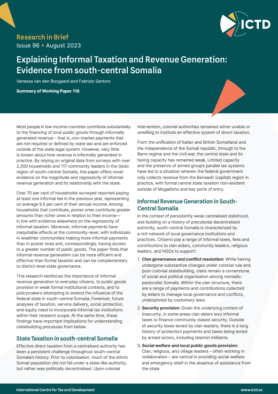Research in Brief 96
Most people in low-income countries contribute substantially to the financing of local public goods through informally generated revenue – that is, non-market payments that are not required or defined by state law and are enforced outside of the state legal system. However, very little is known about how revenue is informally generated in practice. By relying on original data from surveys with over 2,300 households and 117 community leaders in the Gedo region of south-central Somalia, this paper offers novel evidence on the magnitude and regressivity of informal revenue generation and its relationship with the state. Over 70 per cent of households surveyed reported paying at least one informal fee in the previous year, representing on average 9.5 per cent of their annual income. Among households that contribute, poorer ones contribute greater amounts than richer ones in relation to their income— in line with evidence elsewhere on the regressivity of informal taxation. Moreover, informal payments have inequitable effects at the community-level, with individuals in wealthier communities making more informal payments than in poorer ones and, correspondingly, having access to a greater number of public goods. The paper finds that informal revenue generation can be more efficient and effective than formal taxation and can be complementary to district-level state governance. Summary of Working Paper 118.

